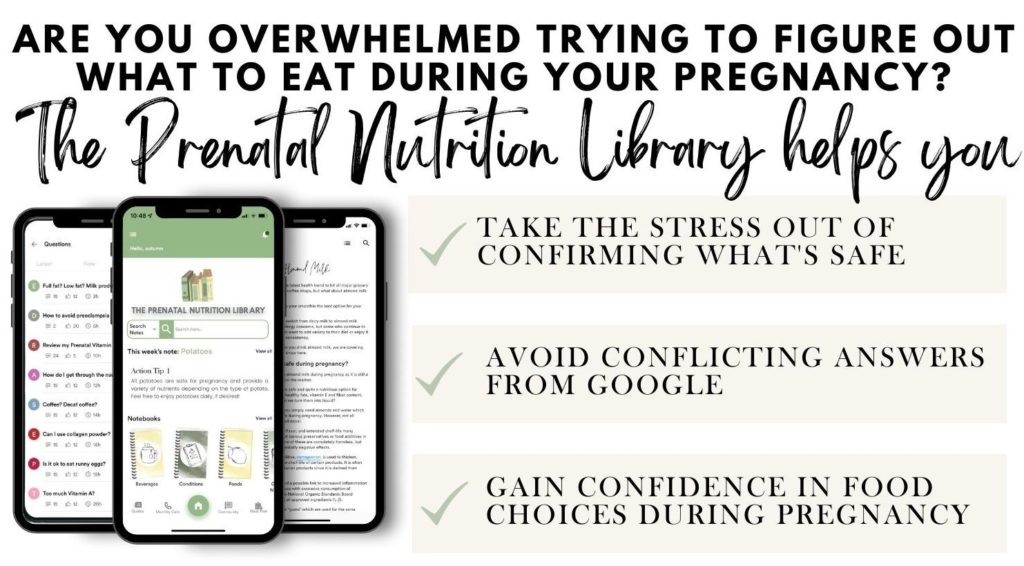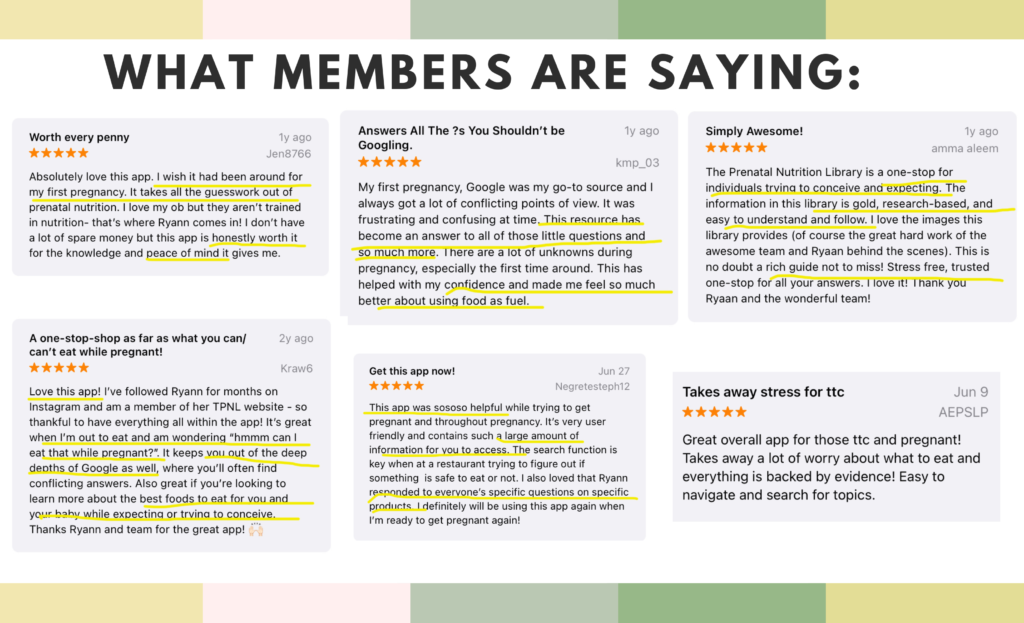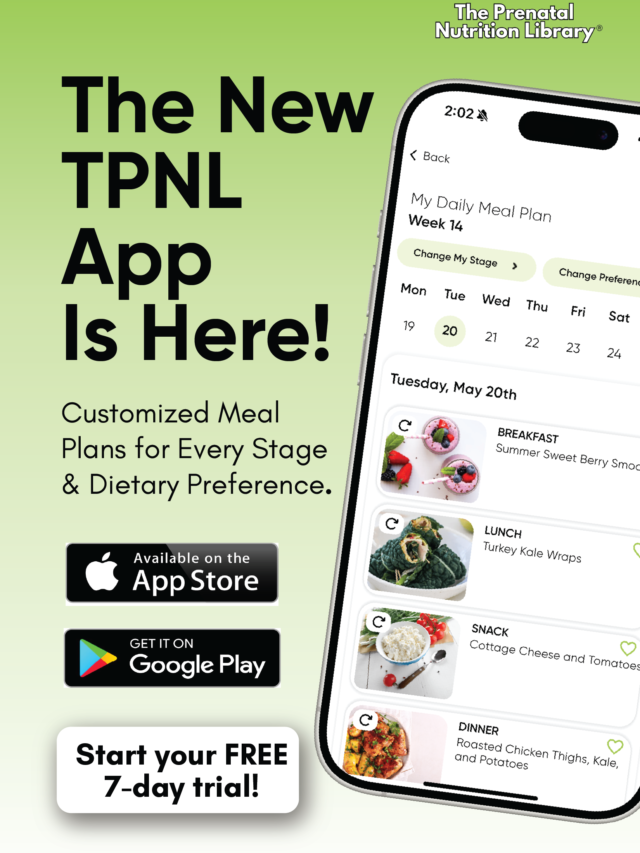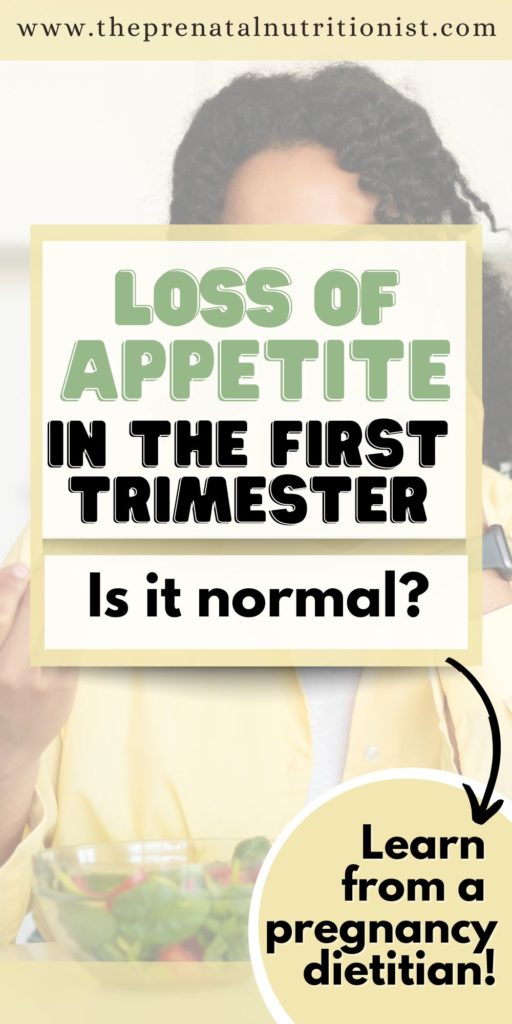
Good nutrition is an important foundation for a healthy pregnancy. Adequate nourishment supports your baby’s growth and development and also supports YOU. Eating plenty of whole foods can make a huge difference, fueling you and your little one with crucial nutrients for pregnancy. Yet, many people face a pretty big challenge throughout the first trimester of pregnancy: a loss of appetite, often accompanied by or due to aversions, nausea, and vomiting.
This can be disheartening, especially when you know how important good nutrition is. This post will look at the common reasons behind appetite changes during early pregnancy and share some practical tips to help you navigate it.
Navigating a Loss Of Appetite In The First Trimester
This post discusses a high-level overview of appetite loss during the first trimester. We will address a few common concerns that mothers may face during this time and provide tips to help you navigate them. We will also look into the changes in pregnancy that can contribute to appetite loss, helping you understand that you’re not alone.
In this post, you can expect practical advice on managing appetite fluctuations. Throughout the blog, you can find other resources to help throughout your pregnancy journey, including snack ideas and hydration tips. Whether navigating nausea or simply not feeling hungry, this guide will provide you with reassurance and help during this important time in your life.
Before we dive in, please know that if you’re currently experiencing nausea and loss of appetite, for most, this does get better as pregnancy progresses! The foods you were eating before pregnancy and your prenatal vitamins are helping to fill gaps and support your baby’s growth during this time. However, if you are battling severe nausea and vomiting or are not able to keep anything down, please talk to your doctor to discuss management strategies as soon as possible.
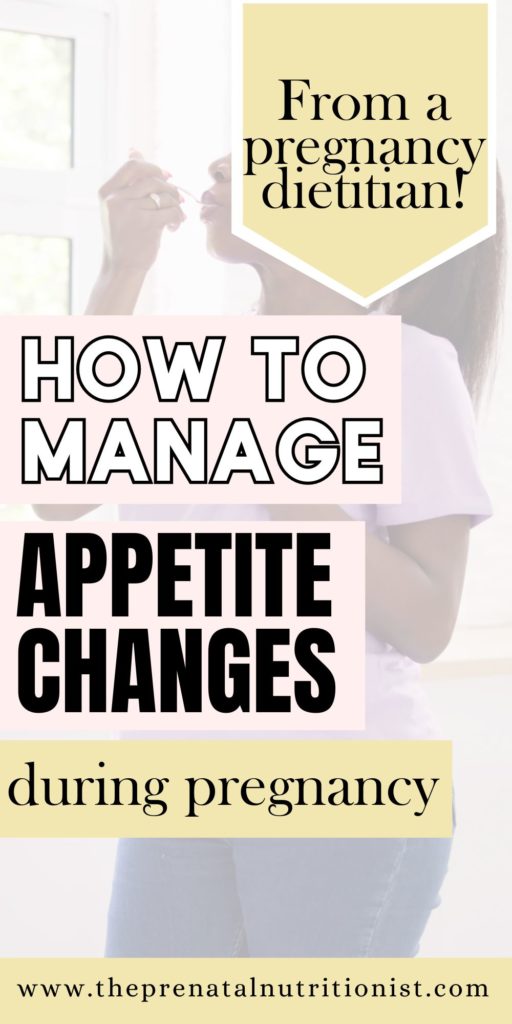
Is Loss of Appetite Normal in the First Trimester?
Yes, loss of appetite during pregnancy is extremely common for mothers during the first trimester. Nausea and vomiting affect approximately 50-80% of expectant mothers, and vomiting is most typically the cause of loss of appetite. We don’t know the exact cause of “morning sickness.” However, most theorize it has at least something to do with hormonal changes, specifically the rise in hormones like progesterone and hCG, which may lead to nausea, vomiting, and loss of appetite.
Additionally, many women find that their usual food cravings and preferences may change dramatically, making it really hard to maintain a regular eating pattern. While nutrition is super important, a decrease in appetite is usually considered a very normal part of the early pregnancy journey. If you’re concerned, know that each pregnancy is unique, and you should never hesitate to talk to your healthcare professional if you need advice. It may also be helpful to know the symptoms of not eating enough during pregnancy.
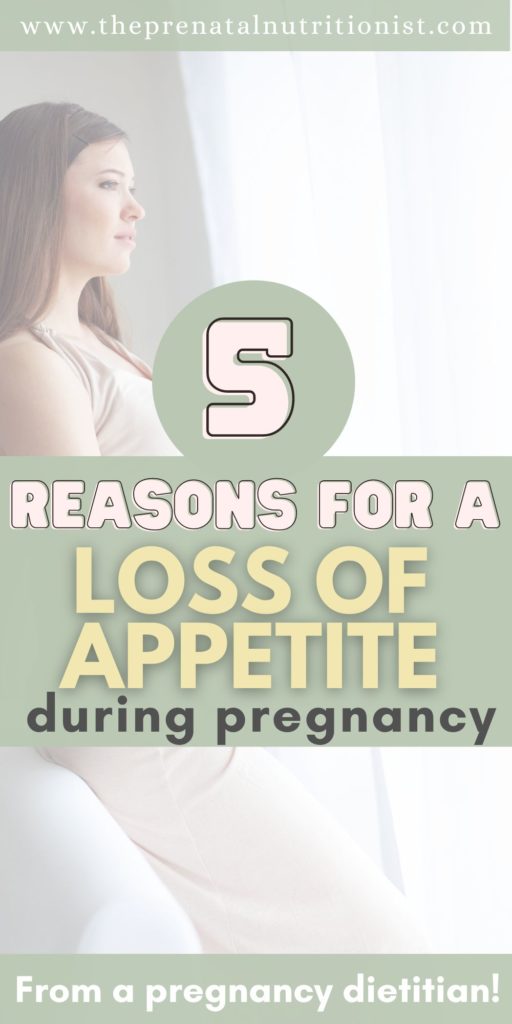
Why Does Your Appetite Change In Early Pregnancy?
Hormonal fluctuations.
During early pregnancy, your body undergoes some pretty big hormonal changes, particularly increased hormones like hCG and progesterone. These pregnancy hormones are important for maintaining the pregnancy but may also contribute to symptoms of “morning sickness” and decreased appetite.
Morning sickness.
Many women experience nausea, often referred to as morning sickness, at any point of the day. This can significantly impact their appetite, making just the thought of food unappealing. For some, the nausea can cause a complete aversion to certain smells or foods.
Heightened sensitivity to smells.
Speaking of smell aversion, pregnant women can deal with this at any point of pregnancy, and it can definitely impact appetite. Scents that you once loved can become overwhelming and sometimes even repulsive. This sensitivity may also be caused by hormonal changes, making eating and cooking hard, even if the food initially sounded good before cooking.
Emotional and psychological factors.
Emotional and physiological changes can happen during pregnancy and affect appetite fluctuations. Many women experience anxiety, stress, and excitement at this time, which can influence eating habits. Navigating these changes can be challenging, impacting how you consume food. Sometimes, you may not feel like eating at all.
Digestive changes.
Pregnancy can cause several changes in digestive health and functioning. Hormonal fluctuations can slow down digestion, leading to discomfort and bloating. This can create a sensation of fullness, even when you haven’t eaten enough. Common issues like constipation can also cause appetite issues, making eating less appealing.
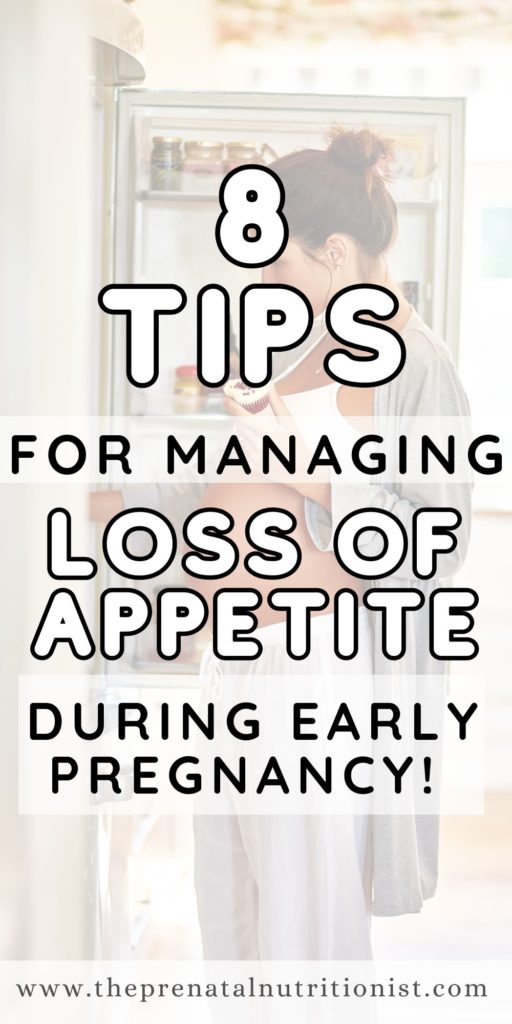
How To Deal With Appetite Changes During Pregnancy
Eat small, more frequent meals.
Instead of the usual three large meals per day, try eating small meals or snacks that are more frequent throughout the day. This can help combat feelings of fullness and nausea. Smaller portions may be more manageable, helping you nourish your body. Even a few bites of a nutrient-rich snack like fruit, nuts, or yogurt can boost nutrient intake.
Stay hydrated.
Dehydration can make feelings of fatigue and nausea even worse, so staying hydrated is really important. Sip on water, herbal teas, water, ginger tea, or bone broths throughout the day. If plain water doesn’t sound great, add a few slices of cucumber, lemon, sliced fruit, or fresh herbs. Water also helps with digestion and the prevention of constipation.
Eat nutrient-dense food when you can.
When you do eat, prioritize including nutrient-dense foods that provide essential vitamins and minerals and aim for food from each food group. Foods like leafy greens, avocados, meat, poultry, eggs, fruits, beans, and whole grains are a great way to fuel your body, even in small portions. If not much sounds good, eat what you can keep down. You will get through this, and there will be more opportunities to include nutrient-dense foods as pregnancy progresses.
Manage sensitivity to smells.
If strong smells trigger nausea, prepare your meals in well-ventilated areas or use methods to minimize smells, such as grilling. If possible, have someone else cook most of the meals. Limit fried foods or anything strong-smelling. You might also find that eating cold meals is better as they usually smell less intense than hot meals.
Add in higher-calorie whole foods.
High-calorie whole foods, such as nut butter, avocados, olive oil, milk, and cheese, can help provide a good source of nutrients and calories at a lower volume when battling poor appetite.
Try protein powder.
Consider incorporating a pregnancy-safe protein powder or collagen peptide powder for an easy protein boost. It can be mixed into water, a liquid of your choice, oatmeal, yogurt bowls, and more. We recommend choosing a third-party protein powder tested for purity and quality of ingredients.
Drink smoothies.
Speaking of protein powder, you can easily mix this isn’t smoothie with fruits and other add-ons, including chia seeds, hemp seeds, or nut butter for protein, fiber, and fats. Smoothies are often well-tolerated and not overly filling when appetite is low.
Seek emotional support.
Emotional changes during pregnancy can be tough, and seeking support is important. Speak to a therapist, family, and friends for support. Meditation or yoga can help you support your mental and emotional health, which directly influences your appetite.
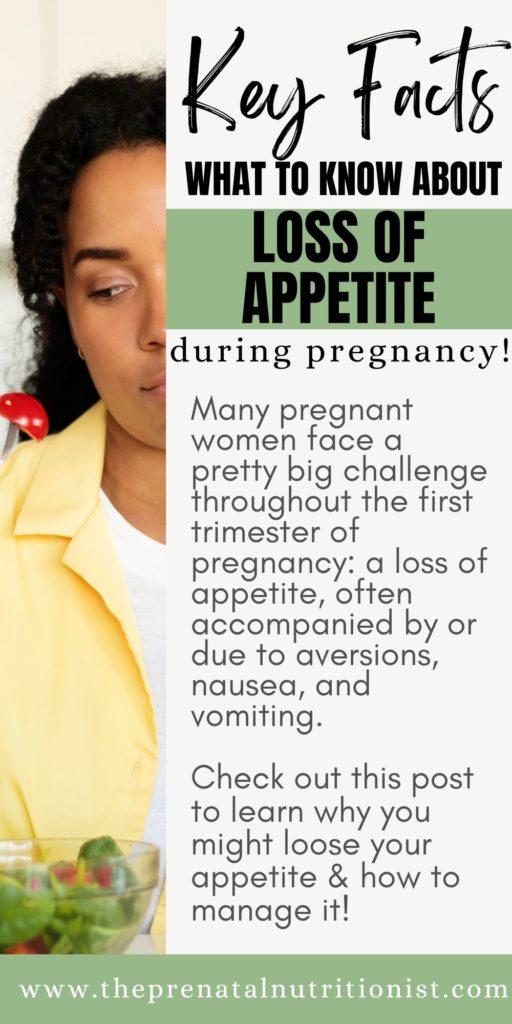
Good nutrition is important, but it’s okay to eat what you can keep down right now!
Navigating nutrition during this time in your life can be hard, especially when your appetite is impacted. With The Prenatal Nutrition Library app (available on both Apple and Android), you can find evidence-based management strategies, education, tips, and meal plans right at your fingertips whenever you need them.
Grab a taste of the resources we offer when you download our FREE one-week meal plan for pregnancy!



